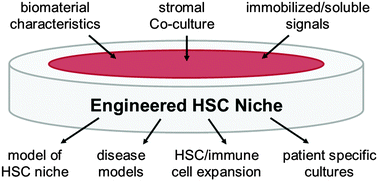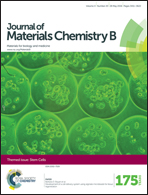Bone-marrow mimicking biomaterial niches for studying hematopoietic stem and progenitor cells†
Abstract
The bone marrow (BM) niche of hematopoietic stem and progenitor cells (HSPCs) is critical for maintaining homeostasis of the hematopoietic system in vivo. It also plays a critical role in many diseases, from cancer metastases to immune dysfunctions. While this microenvironment is well studied, we still do not have a full understanding of bone marrow functions and the HSPC niche. Reconstructing the bone marrow microenvironment in vitro using biomaterials has the potential to further our understanding of the complex HSPC niche, provide new insights on how various cells function within these niches, how complex disease processes happens within the BM, and also serve as a tool for more efficient generation of high quality, therapeutic hematopoietic and mesenchymal cells. Many synthetic and natural materials have been used to replicate the known physical and biochemical properties of bone marrow. Here we review key components and considerations for designing materials to engineer bone marrow niches and study HSPC behavior and disease pathologies. We also provide future perspectives on areas where new knowledge must be gained to achieve the scientific and clinical potential of materials-driven bone marrow niche development.

- This article is part of the themed collection: Stem Cells

 Please wait while we load your content...
Please wait while we load your content...